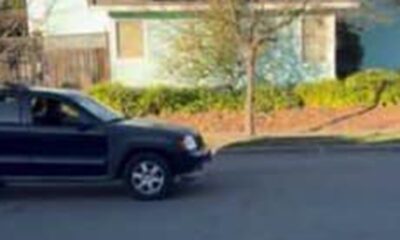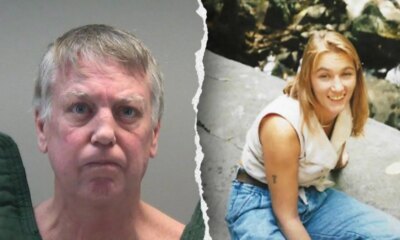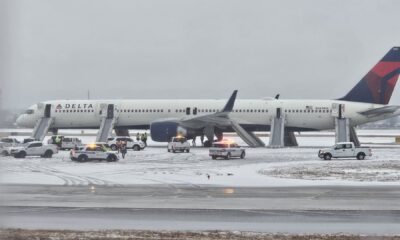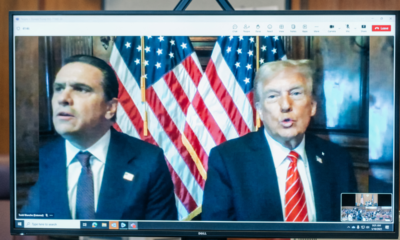Business
Whether You Call It ‘Skiplagging’ or ‘Hidden-City Travel,’ It’s Contentious

On the last day of June, American Airlines agents at Gainesville Regional Airport in Florida canceled a North Carolina teenager’s flight after realizing that he had used a booking tactic called “skiplagging” or “hidden-city travel,” forbidden by airlines but used by some travelers to net flight bargains.
The teen’s father, Hunter Parsons, said it was his 17 year old’s first time flying unaccompanied and that both the timing and price of the booking made it appealing — for $150, his son was to fly from Gainesville to Charlotte, and not continue on the second flight to New York, a cost savings of roughly $300 if the family had simply purchased a direct flight to Charlotte. But Mr. Parsons’ son didn’t even make it past the check-in counter in Gainesville, where the airline agents questioned why the teen would fly to New York when his layover was in his hometown, Charlotte. He was forced to pay for a direct flight.
Skiplagging is buying a ticket for a connecting flight, with a layover in the city that’s the real destination for the traveler. Flyers disembark after the first leg and simply fail to board the second. Often the fare is cheaper than if they’d actually bought a direct flight to their desired destination. At least two websites now help unearth these deals for consumers.
Though it is not illegal, the practice is strictly prohibited by airlines in their contracts of carriage. And carriers have shown an erratic but heavy hand in administering punishment for those caught, eliminating a skiplagger’s frequent flier miles in one instance and suing a passenger in another. Mr. Parsons said that American banned his son from traveling with the carrier for three years.
Experts say that travelers have flown this way for decades and that detecting improper use of connections is tricky, making enforcement a challenge for airlines. Here’s what to know about this open secret of flying.
How does it work?
Airline ticket costs are determined by many factors, such as energy prices, passenger demand for certain routes and competition from other airlines. They aren’t merely a reflection of travel distance. For travelers, this means that it can occasionally be more affordable to book a flight with a layover along a more competitive route and get off there, rather than booking a nonstop flight to the desired location.
For instance, a traveler in Fort Lauderdale, Fla., wants to fly to San Francisco. A recent search turned up a flight from Fort Lauderdale to Portland, Ore., with a stop in San Francisco, for about $124. A nonstop flight from Fort Lauderdale to San Francisco would cost about $220.
Skiplagged and Kiwi facilitate searching for and booking these kinds of deals.
But it requires staying undetected. You can’t check a bag or link a frequent flier account to collect the mileage. And travelers who show patterns — flying the same routes repeatedly and missing the last leg of a flight — are more likely to be caught.
Why is it gaining in popularity?
Short answer: the cost of airfare, which has soared in recent years.
Mary Cropper, a travel specialist with Boston-based Audley Travel, called airfare pricing a “perfect storm.” Rising fares, in addition to fees for everything from beverages to printing boarding passes, have made skiplagging more enticing to passengers. While she doesn’t advise her clients to book this way, she said she understood the motivation.
“Why wouldn’t someone want to save 50 percent on an airline ticket, something that’s just so expensive these days?” Ms. Cropper asked.
Aktarer Zaman, Skiplagged’s founder and chief executive, emphasized that his website has “empowered people to make their own decisions” by digging up alternatives to current airline pricing practices, which he described as “price gouging.”
What are the risks?
Upon purchasing a ticket, travelers agree to a contract of carriage with the airline, which is a set of rules passengers agree to comply with. These cover everything from how a carrier will handle oversold flights to requirements regarding passengers’ clothing and behavior. These terms and conditions also often explicitly forbid hidden-city ticketing and lay out a raft of consequences should travelers circumvent the rules.
United Airlines reserves the right to permanently ban travelers who don’t complete their trip. They also say they can revoke status and wipe out accrued mileage. Alaska Airlines mentions that it can take legal action against passengers who violate their policies.
American says in its fine print that it has the right to a number of actions, such as canceling any unused portion of the ticket, refusing to let the passenger fly and billing the customer for what the intended route would have cost.
Curtis Blessing, a spokesman for American, called this type of travel an “all-around bad outcome” that could cause issues with checked bags and also prevent other customers, who might have urgent travel needs, from booking seats.
Airlines have mostly taken aim at the online providers, in past years filing a handful of lawsuits against Skiplagged and Kiwi. Earlier this summer, American sued Kiwi in federal court in Texas, claiming that the “rogue online travel agent” had repeatedly engaged in “abusive ticketing practices,” including booking hidden city fares for its customers, according to court documents.
So far, litigation has been unsuccessful in blocking this travel hack. One lawsuit filed in 2014 by United against Skiplagged was dismissed, while in 2021, Southwest Airlines sued Skiplagged for using the carrier’s data. Skiplagged argued that they were not the ones actually distributing Southwest tickets; they showed flights but directed users to other websites for booking. Both parties later agreed to drop the lawsuit, Mr. Zaman said.
In 2018, Lufthansa sued a passenger who had booked a round-trip flight from Oslo to Seattle but then stayed in Frankfurt, the flight’s layover city. The airline later dropped the lawsuit.
However, there are plentiful anecdotes online of passengers who say they’ve been threatened with lifetime bans and with the loss of all their frequent flier mileage.
Is it an ethical way to travel? How much of an issue is it for airlines anyway?
“The question is whether you think it has any impact on the provider and whether you care,” said Robert Mann, an aviation analyst and a former American executive. Airlines say that exploitation of hidden-city fares results in empty seats that could have been booked by others.
In its lawsuit against Kiwi, American also said that passenger no-shows can delay flights by triggering searches for the traveler and any luggage involved, and waste fuel that is calculated by passenger count.
Others say that these fares are a loophole of an airline’s own making, and a reflection of their pricing priorities. By law, airlines can set whatever prices and routes they want.
“It can be argued charging much higher prices for shorter distances is unfair and especially penalizes frequent fliers to hub cities,” where high demand generally means costlier airfare, said Paul Hudson, the founder of a passengers rights advocacy group called Flyers Rights.
What can you do if you’re penalized for skiplagging?
Very little. Bart Banino, an attorney at Condon & Forsyth, a firm specializing in aviation law, emphasized that passengers are obligated to adhere to the airline’s terms and conditions — that contract of carriage — whether that means traveling on the route they’ve purchased, or paying a fare difference when they’re caught breaking the rules.

Business
Cookies, Cocktails and Mushrooms on the Menu as Justices Hear Bank Fraud Case

In a lively Supreme Court argument on Tuesday that included references to cookies, cocktails and toxic mushrooms, the justices tried to find the line between misleading statements and outright lies in the case of a Chicago politician convicted of making false statements to bank regulators.
The case concerned Patrick Daley Thompson, a former Chicago alderman who is the grandson of one former mayor, Richard J. Daley, and the nephew of another, Richard M. Daley. He conceded that he had misled the regulators but said his statements fell short of the outright falsehoods he said were required to make them criminal.
The justices peppered the lawyers with colorful questions that tried to tease out the difference between false and misleading statements.
Chief Justice John G. Roberts Jr. asked whether a motorist pulled over on suspicion of driving while impaired said something false by stating that he had had one cocktail while omitting that he had also drunk four glasses of wine.
Caroline A. Flynn, a lawyer for the federal government, said that a jury could find the statement to be false because “the officer was asking for a complete account of how much the person had had to drink.”
Justice Ketanji Brown Jackson asked about a child who admitted to eating three cookies when she had consumed 10.
Ms. Flynn said context mattered.
“If the mom had said, ‘Did you eat all the cookies,’ or ‘how many cookies did you eat,’ and the child says, ‘I ate three cookies’ when she ate 10, that’s a false statement,” Ms. Flynn said. “But, if the mom says, ‘Did you eat any cookies,’ and the child says three, that’s not an understatement in response to a specific numerical inquiry.”
Justice Sonia Sotomayor asked whether it was false to label toxic mushrooms as “a hundred percent natural.” Ms. Flynn did not give a direct response.
The case before the court, Thompson v. United States, No. 23-1095, started when Mr. Thompson took out three loans from Washington Federal Bank for Savings between 2011 and 2014. He used the first, for $110,000, to finance a law firm. He used the next loan, for $20,000, to pay a tax bill. He used the third, for $89,000, to repay a debt to another bank.
He made a single payment on the loans, for $390 in 2012. The bank, which did not press him for further payments, went under in 2017.
When the Federal Deposit Insurance Corporation and a loan servicer it had hired sought repayment of the loans plus interest, amounting to about $270,000, Mr. Thompson told them he had borrowed $110,000, which was true in a narrow sense but incomplete.
After negotiations, Mr. Thompson in 2018 paid back the principal but not the interest. More than two years later, federal prosecutors charged him with violating a law making it a crime to give “any false statement or report” to influence the F.D.I.C.
He was convicted and ordered to repay the interest, amounting to about $50,000. He served four months in prison.
Chris C. Gair, a lawyer for Mr. Thompson, said his client’s statements were accurate in context, an assertion that met with skepticism. Justice Elena Kagan noted that the jury had found the statements were false and that a ruling in Mr. Thompson’s favor would require a court to rule that no reasonable juror could have come to that conclusion.
Justices Neil M. Gorsuch and Brett M. Kavanaugh said that issue was not before the court, which had agreed to decide the legal question of whether the federal law, as a general matter, covered misleading statements. Lower courts, they said, could decide whether Mr. Thompson had been properly convicted.
Justice Samuel A. Alito Jr. asked for an example of a misleading statement that was not false. Mr. Gair, who was presenting his first Supreme Court argument, responded by talking about himself.
“If I go back and change my website and say ‘40 years of litigation experience’ and then in bold caps say ‘Supreme Court advocate,’” he said, “that would be, after today, a true statement. It would be misleading to anybody who was thinking about whether to hire me.”
Justice Alito said such a statement was, at most, mildly misleading. But Justice Kagan was impressed.
“Well, it is, though, the humblest answer I’ve ever heard from the Supreme Court podium,” she said, to laughter. “So good show on that one.”
Business
SEC probes B. Riley loan to founder, deals with franchise group

B. Riley Financial Inc. received more demands for information from federal regulators about its dealings with now-bankrupt Franchise Group as well as a personal loan for Chairman and co-founder Bryant Riley.
The Los Angeles-based investment firm and Riley each received additional subpoenas in November from the U.S. Securities and Exchange Commission seeking documents and information about Franchise Group, or FRG, the retail company that was once one of its biggest investments before its collapse last year, according to a long-delayed quarterly filing. The agency also wants to know more about Riley’s pledge of B. Riley shares as collateral for a personal loan, the filing shows.
B. Riley previously received SEC subpoenas in July for information about its dealings with ex-FRG chief executive Brian Kahn, part of a long-running probe that has rocked B. Riley and helped push its shares to their lowest in more than a decade. Bryant Riley, who founded the company in 1997 and built it into one of the biggest U.S. investment firms beyond Wall Street, has been forced to sell assets and raise cash to ease creditors’ concerns.
The firm and Riley “are responding to the subpoenas and are fully cooperating with the SEC,” according to the filing. The company said the subpoenas don’t mean the SEC has determined any violations of law have occurred.
Shares in B. Riley jumped more than 25% in New York trading after the company’s overdue quarterly filing gave investors their first formal look at the firm’s performance in more than half a year. The data included a net loss of more than $435 million for the three months ended June 30. The shares through Monday had plunged more than 80% in the past 12 months, trading for less than $4 each.
B. Riley and Kahn — a longstanding client and friend of Riley’s — teamed up in 2023 to take FRG private in a $2.8-billion deal. The transaction soon came under pressure when Kahn was tagged as an unindicted co-conspirator by authorities in the collapse of an unrelated hedge fund called Prophecy Asset Management, which led to a fraud conviction for one of the fund’s executives.
Kahn has said he didn’t do anything wrong, that he wasn’t aware of any fraud at Prophecy and that he was among those who lost money in the collapse. But federal investigations into his role have spilled over into his dealings with B. Riley and its chairman, who have said internal probes found they “had no involvement with, or knowledge of, any alleged misconduct concerning Mr. Kahn or any of his affiliates.”
FRG filed for Chapter 11 bankruptcy in November, a move that led to hundreds of millions of dollars of losses for B. Riley. The collapse made Riley “personally sick,” he said at the time.
One of the biggest financial problems to arise from the FRG deal was a loan that B. Riley made to Kahn for about $200 million, which was secured against FRG shares. With that company’s collapse into bankruptcy in November wiping out equity holders, the value of the remaining collateral for this debt has now dwindled to only about $2 million, the filing shows.
Griffin writes for Bloomberg.
Business
Starbucks Reverses Its Open-Door Policy for Bathroom Use and Lounging

Starbucks will require people visiting its coffee shops to buy something in order to stay or to use its bathrooms, the company announced in a letter sent to store managers on Monday.
The new policy, outlined in a Code of Conduct, will be enacted later this month and applies to the company’s cafes, patios and bathrooms.
“Implementing a Coffeehouse Code of Conduct is something most retailers already have and is a practical step that helps us prioritize our paying customers who want to sit and enjoy our cafes or need to use the restroom during their visit,” Jaci Anderson, a Starbucks spokeswoman, said in an emailed statement.
Ms. Anderson said that by outlining expectations for customers the company “can create a better environment for everyone.”
The Code of Conduct will be displayed in every store and prohibit behaviors including discrimination, harassment, smoking and panhandling.
People who violate the rules will be asked to leave the store, and employees may call law enforcement, the policy says.
Before implementation of the new policy begins on Jan. 27, store managers will be given 40 hours to prepare stores and workers, according to the company. There will also be training sessions for staff.
This training time will be used to prepare for other new practices, too, including asking customers if they want their drink to stay or to go and offering unlimited free refills of hot or iced coffee to customers who order a drink to stay.
The changes are part of an attempt by the company to prioritize customers and make the stores more inviting, Sara Trilling, the president of Starbucks North America, said in a letter to store managers.
“We know from customers that access to comfortable seating and a clean, safe environment is critical to the Starbucks experience they love,” she wrote. “We’ve also heard from you, our partners, that there is a need to reset expectations for how our spaces should be used, and who uses them.”
The changes come as the company responds to declining sales, falling stock prices and grumbling from activist investors. In August, the company appointed a new chief executive, Brian Niccol.
Mr. Niccol outlined changes the company needed to make in a video in October. “We will simplify our overly complex menu, fix our pricing architecture and ensure that every customer feels Starbucks is worth it every single time they visit,” he said.
The new purchase requirement reverses a policy Starbucks instituted in 2018 that said people could use its cafes and bathrooms even if they had not bought something.
The earlier policy was introduced a month after two Black men were arrested in a Philadelphia Starbucks while waiting to meet another man for a business meeting.
Officials said that the men had asked to use the bathroom, but that an employee had refused the request because they had not purchased anything. An employee then called the police, and part of the ensuing encounter was recorded on video and viewed by millions of people online, prompting boycotts and protests.
In 2022, Howard Schultz, the Starbucks chief executive at the time, said that the company was reconsidering the open-bathroom policy.
-

 Health1 week ago
Health1 week agoOzempic ‘microdosing’ is the new weight-loss trend: Should you try it?
-
/cdn.vox-cdn.com/uploads/chorus_asset/file/25822586/STK169_ZUCKERBERG_MAGA_STKS491_CVIRGINIA_A.jpg)
/cdn.vox-cdn.com/uploads/chorus_asset/file/25822586/STK169_ZUCKERBERG_MAGA_STKS491_CVIRGINIA_A.jpg) Technology6 days ago
Technology6 days agoMeta is highlighting a splintering global approach to online speech
-

 Science4 days ago
Science4 days agoMetro will offer free rides in L.A. through Sunday due to fires
-
/cdn.vox-cdn.com/uploads/chorus_asset/file/25821992/videoframe_720397.png)
/cdn.vox-cdn.com/uploads/chorus_asset/file/25821992/videoframe_720397.png) Technology1 week ago
Technology1 week agoLas Vegas police release ChatGPT logs from the suspect in the Cybertruck explosion
-

 Movie Reviews1 week ago
Movie Reviews1 week ago‘How to Make Millions Before Grandma Dies’ Review: Thai Oscar Entry Is a Disarmingly Sentimental Tear-Jerker
-

 Health1 week ago
Health1 week agoMichael J. Fox honored with Presidential Medal of Freedom for Parkinson’s research efforts
-

 Movie Reviews1 week ago
Movie Reviews1 week agoMovie Review: Millennials try to buy-in or opt-out of the “American Meltdown”
-

 News1 week ago
News1 week agoPhotos: Pacific Palisades Wildfire Engulfs Homes in an L.A. Neighborhood



















